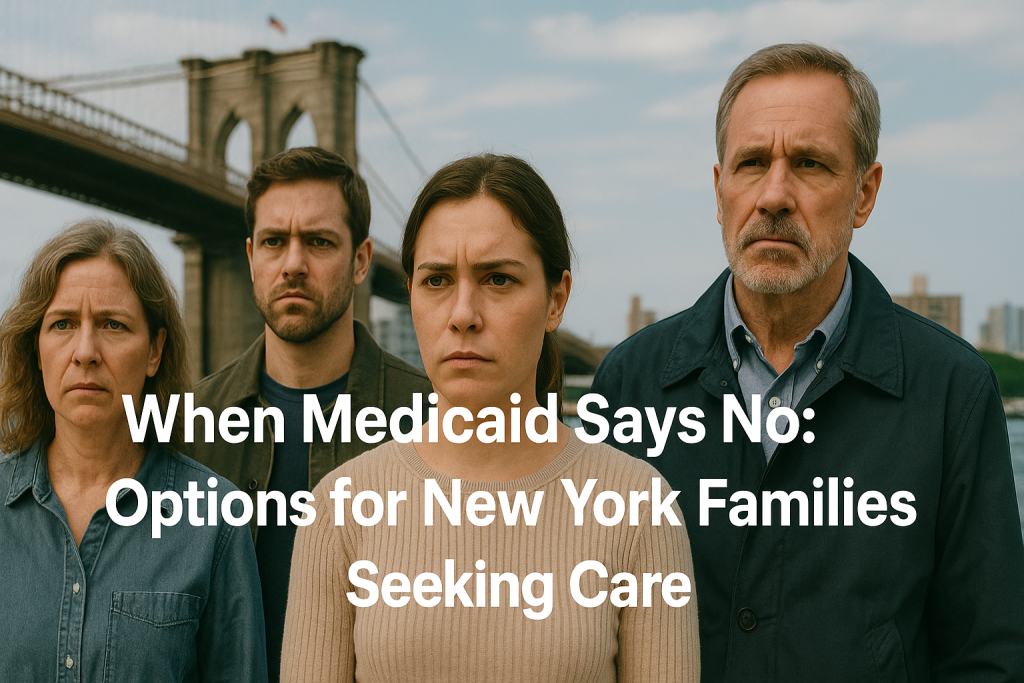Table of Content
1.Introduction: The Pain of Hearing “No”
2.Why Medicaid Denials Happen in New York
3.First Steps After a Medicaid Denial
4.Home Care Alternatives While You Appeal
5.The Hidden Cost of Doing Nothing
6.How SecureSafer Helps NYC Families
Introduction: The Pain of Hearing “No”
For many New York families, the moment comes like a punch to the stomach. A loved one finally qualifies for help with daily living — bathing, meal prep, supervision — only for Medicaid to send back a letter stamped “denied.”
In a city where rent, groceries, and caregiving costs are already overwhelming, a Medicaid denial can feel like the rug has been pulled out from under you. But if your family is facing this situation, you are not out of options.
ADVERTISEMENT
At SecureSafer, we work alongside NYC families every day to guide them through denials, appeals, and safe alternatives that keep loved ones cared for and protected.
Why Medicaid Denials Happen in New York
Denials can be confusing, but they often trace back to a handful of issues. Families typically face rejection because:
- The application was incomplete or missing documents.
- The applicant did not meet strict medical necessity requirements for long-term care.
- Financial eligibility thresholds were misunderstood.
- A managed long-term care plan (MLTC) made a determination that seems inconsistent with the family’s reality.
The New York State Department of Health sets detailed requirements for Medicaid eligibility, and each case is judged against those rules (health.ny.gov).
First Steps After a Medicaid Denial
If Medicaid says no, don’t panic. Your next actions should be deliberate and documented.
Step 1: Read the Denial Letter Carefully
Every Medicaid denial in New York must include a written explanation. Look for specific codes or reasons.
Step 2: Collect Supporting Evidence
Medical records, doctor’s notes, and evaluations can often close the gap between what Medicaid believes and what your loved one needs.
Step 3: File an Appeal Promptly
Families have the right to request a Fair Hearing through the Office of Temporary and Disability Assistance (otda.ny.gov). This is a chance to present your side before an administrative law judge.
Home Care Alternatives While You Appeal
Appeals take time. While waiting, NYC families can explore options such as:
- Private Pay Home Aides: Though costly, short-term assistance can prevent caregiver burnout.
- Community-Based Support Services: Many borough-based organizations in Queens, the Bronx, and Brooklyn offer sliding-scale respite care.
- Health Insurance Riders: Some long-term care needs may be partially covered under Medicare or private health insurance (medicare.gov).
These bridge solutions can keep your loved one safe until Medicaid coverage is resolved.
The Hidden Cost of Doing Nothing
Skipping care, even for a few weeks, takes a toll. Missed medications, poor nutrition, and fall risks add up quickly. Families often underestimate the hidden costs of waiting — hospital bills, emergency room visits, or even long-term complications that far exceed the cost of acting early.
ADVERTISEMENT
In fact, New York State research shows that gaps in long-term care access increase hospital readmission rates significantly (dfs.ny.gov).
How SecureSafer Helps NYC Families
We know how stressful Medicaid denials can feel. Our role is to simplify the process:
- Reviewing denial letters with families.
- Guiding through appeals and Fair Hearings.
- Helping identify short-term coverage solutions.
- Connecting families with community programs that provide relief.
Every New Yorker deserves the dignity of safe, reliable care. At SecureSafer, we make sure families never navigate these denials alone.
Compliance Note
This article is for educational purposes only. SecureSafer does not guarantee Medicaid approvals, benefits, or savings. All eligibility and program details should be confirmed directly through Medicare.gov, New York State Department of Financial Services, or New York State Department of Health.
| Need Help Now? Don’t Wait. ✅ Call our SecureSafer team directly at SecureSafer.com or call (646) 444-2020 ✅ Request a policy review or switch evaluation today. |
ADVERTISEMENT

